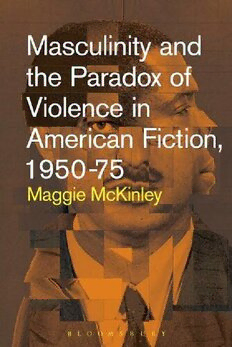
Masculinity and the Paradox of Violence in American Fiction, 1950–75 PDF
218 Pages·2015·2.021 MB·English
Most books are stored in the elastic cloud where traffic is expensive. For this reason, we have a limit on daily download.
Preview Masculinity and the Paradox of Violence in American Fiction, 1950–75
Description:
In Masculinity and the Paradox of Violence in American Fiction, 1950–75, Maggie McKinley explores the intersections of violence, masculinity, and racial and ethnic tension in America as it is depicted in fiction published by Ralph Ellison, Richard Wright, Norman Mailer, Saul Bellow, James Baldwin, and Philip Roth. This particular time period, marked as it was by cultural and political turbulence that elicited passionate and revolutionary arguments regarding race, ethnicity, and gender, makes it a useful era on which to focus a study of these intersecting phenomena. With such cultural context in mind, the book reconsiders the longstanding association between masculinity and violence, locating within works by the aforementioned authors a problematic paradox: while each text under consideration represents violence as central to the establishment of a liberated masculine identity, the deployment of this violence often reaffirms many constricting and emasculating cultural myths and power structures that both the authors and protagonists are seeking to overturn. Drawing from the work of Simone de Beauvoir and Hannah Arendt, McKinley argues that by using violence to resolve gendered existential crises, the protagonists actually serve to mire themselves more deeply within the racial and gendered conflicts that trigger their masculine anxiety. On a larger scale, this book assists in drawing attention to the ways that unrealistic but idealized images of masculinity, which are held up as the norm against which all genders are judged and subsequently categorized in society, often silence and marginalize those who do not meet these standards.Maggie McKinley reconsiders the longstanding association between masculinity and violence, locating a problematic paradox within works by these writers: as each author figures violence as central to the establishment of a liberated masculine identity, the use of this violence often reaffirms many constricting and emasculating cultural myths and power structures that the authors and their protagonists are seeking to overturn.
See more
The list of books you might like
Most books are stored in the elastic cloud where traffic is expensive. For this reason, we have a limit on daily download.
